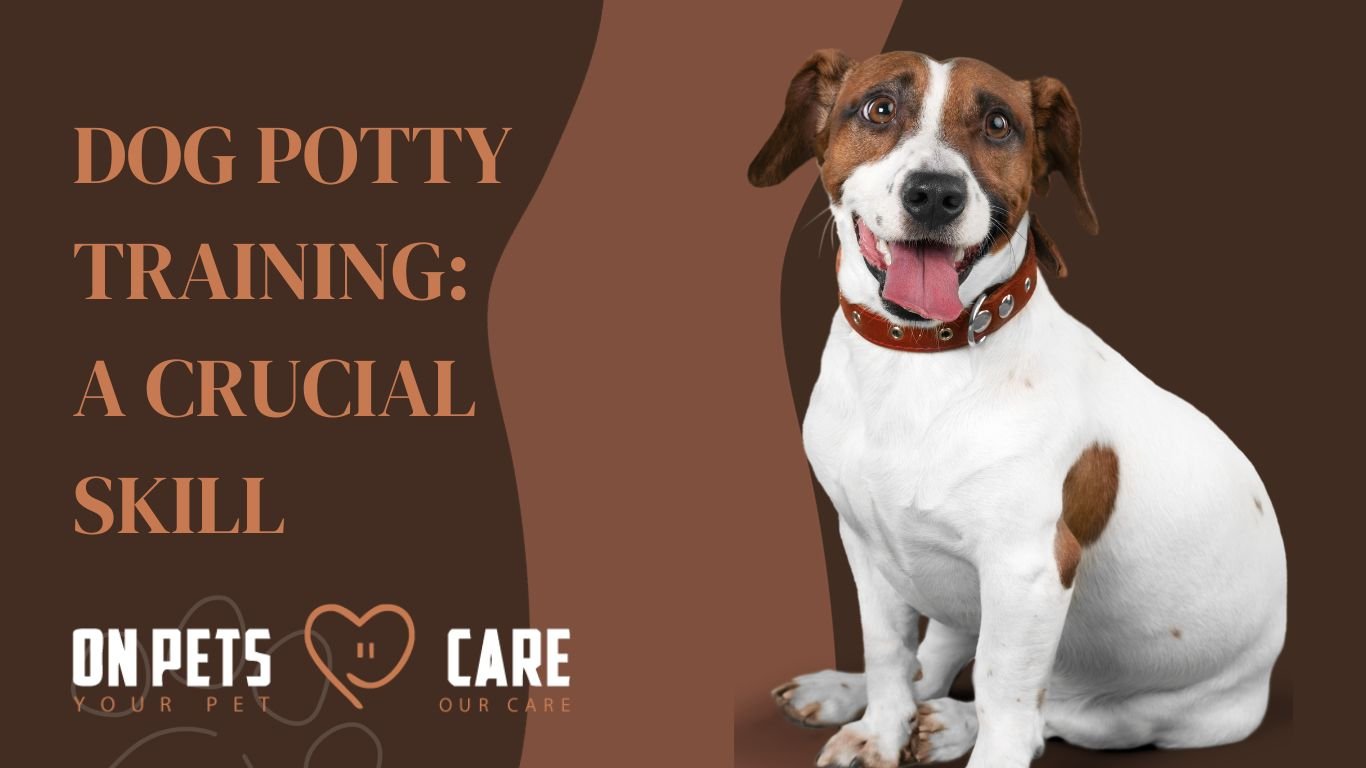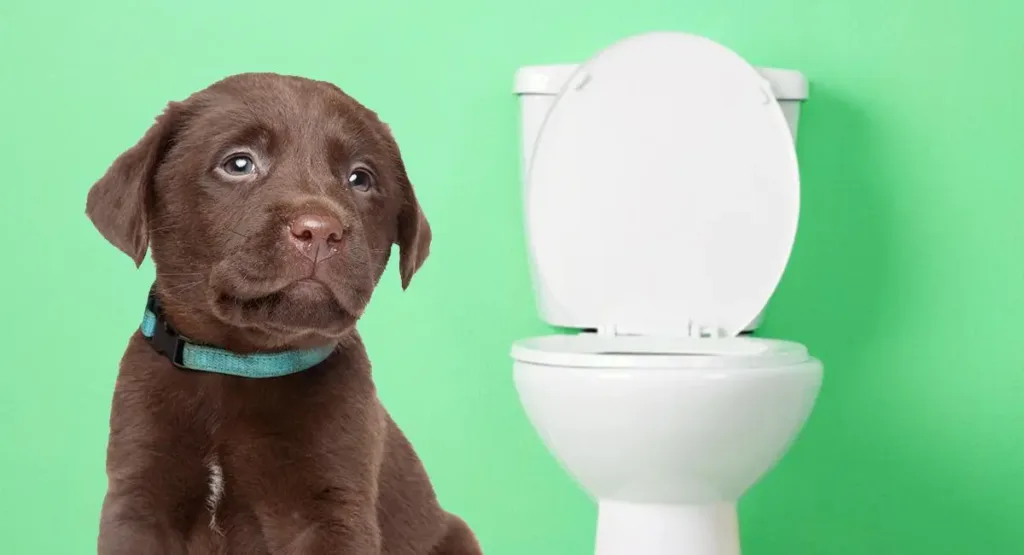10 Tips and Tricks for Successful Dog Potty Training

Dog Potty training is very necessary if you want to neat your surroundings and enjoy your companionship with your pets. It’s an opportunity for quality bonding with your furry friend. Those Dog Potty training sessions become more than just where to go they’re moments where you and your pup connect. Plus, a well-trained dog means more freedom for them to roam without causing chaos.

Table of Contents
Why Give Dog Potty Training:
Why put in the effort for dog potty training? It’s not just about avoiding those little surprises around the house. Think of it as the golden ticket to a harmonious and happy coexistence with your furry friend. Potty training goes beyond cleanliness; it’s a bridge to a stronger bond between you and your pup.
Fewer indoor accidents mean more quality time spent together, fostering a deeper connection. Additionally, a well-trained pup translates to more freedom for them and less worry for you. So, why give dogs potty training? Because it’s the key to a cleaner, closer, and more carefree companionship with your four-legged family member.
| 1. A Clean Home: |
| – Avoiding indoor accidents keeps your living space tidy. |
| 2. Stronger Bond: |
| – Training sessions become moments of quality bonding. |
| – A deeper connection between you and your furry friend. |
| 3. Freedom to Roam: |
| – A well-trained pup means more freedom for exploration. |
| – Less worry about chaos, allowing your pup to roam freely. |
| 4. Harmonious Coexistence: |
| – Establishing a routine creates a harmonious living space. |
| – Enjoy a life filled with shared joy and understanding. |
Benefits of Dog Potty Training:
- A Happy Home: No one enjoys playing detective in a house of hidden surprises. Why having your dog trained to use the potty means that your home is tidy and comfortable for both of you.
- Bonding Time: Learning where to go is not the only thing covered in training sessions. Additionally, they present chances for constructive engagement that will deepen the link between you and your animal companion.
- Freedom to Roam: A well-trained pup means less time on the leash and more freedom for them to explore safely without causing havoc.
- Health and Hygiene: Regular potty breaks contribute to your dog’s overall health and hygiene, preventing potential urinary tract infections or discomfort.
Puppy Potty Training Schedule by Age:

Wondering when to start and how to adjust the training routine as your pup grows? Let’s break it down:
| Age Range | Activities |
|---|---|
| 8-12 Weeks | The basics begin here. Focus on establishing a routine and using positive reinforcement. |
| 3-4 Months | Reinforce good habits and gradually extend the time between potty breaks. |
| 5-6 Months | Begin transitioning from puppy pads to outdoor potty. Continue positive reinforcement. |
| 7-12 Months | Fine-tune the routine, and celebrate as your pup becomes a potty pro. |
10 Tips for Successful Dog Potty Training:

Is your house home to mystery messes and surprise puddles? Don’t worry, fellow dog lover! Teaching your pup where to go potty doesn’t have to be a headache. With a little bit of patience, a whole lot of love, and these 10 super-simple tips, you’ll have your furry friend saying goodbye to accidents and hello to tail-wagging celebrations in no time!
Go on a dog potty training adventure? Here are ten tips to guide you through the process.
1. Start Early, Start Now:
Begin the potty training journey when your pup is still tiny. In their early years, puppies absorb information like sponges, just like humans do. Early on is the best time to establish lifelong habits. This is the time when your furry friend is most impressionable, making it easier to instill good potty habits that they’ll carry into adulthood.
2. Consistency is Key:
Dogs thrive on routines, and establishing a consistent potty routine is crucial. Choose a specific spot for your pup to do their business, stick to it, and maintain a regular schedule. This repetition helps your furry buddy understand where and when they should go, creating a sense of predictability that aids in the learning process.
3. Positive Reinforcement:
Celebrate the victories, no matter how small! Positive reinforcement, such as treats and cheers, plays a pivotal role in potty training success. When your pup associates going potty in the right spot with positive experiences, they become more motivated to repeat the behavior. It’s all about making the learning process enjoyable for your furry companion.
4. Patience, Patience, Patience:
Building a canine Einstein doesn’t happen overnight. Patience is the key ingredient in this training recipe. Stay calm, keep your cool, and avoid unnecessary stress during the learning curve. Dogs pick up on your energy, and a patient and relaxed atmosphere fosters a positive learning environment.
5. Understand the Signals:
Dogs have their unique ways of signaling when ‘nature’s calling.’ Pay close attention to your pup’s cues – be it pacing, sniffing, or sudden restlessness. Understanding these signals allows you to act promptly, taking them to their designated potty spot before accidents happen.
6. Regular Bathroom Breaks:
Avoid playing a risky game of canine roulette by taking your pup out frequently. Regular bathroom breaks, especially after meals or naps, help prevent accidents. Consistency in providing opportunities for your pup to relieve themselves contributes significantly to successful potty training.
7. Designated Potty Area:
Create a specific bathroom zone for your pup. Whether it’s a patch of grass in the yard or a designated corner indoors, having a consistent spot reinforces the habit. This establishes a clear association between the chosen area and the act of going potty, making the process more straightforward for your furry friend.
8. Avoid Punishment:
Accidents are bound to happen during the learning process. When they do, resist the urge to unleash disciplinary measures. Dogs respond much better to positive reinforcement than scolding. Encourage good behavior and redirect when needed, creating a positive and encouraging atmosphere for your pup.
9. Limit Water Before Bed:
Just like humans, pups prefer uninterrupted sleep without midnight bathroom runs. To minimize nighttime potty breaks, reduce your pup’s water intake before bedtime. This simple adjustment contributes to a more restful night for both you and your furry companion.
10. Seek Professional Help if Needed:
If your pup is facing challenges with potty training, don’t hesitate to seek professional advice. A professional trainer can offer tailored guidance and strategies to address specific issues. Sometimes, a little expert assistance can make all the difference in overcoming hurdles and ensuring a successful potty training journey.
Onpetscare | Providing Everything Your Pet Needs:

Onpetscare is your go-to hub for all things pet-related. Our mission is to improve the quality of life for both loved dogs and their owners as Austin’s most reliable pet business. We are Fur-ever Friends, providing Fur-ever Quality in all pet supplies to all pets. We are more than simply a pet store, with over 40 Product categories and a carefully chosen assortment of the greatest brands in the business.
Visit our website or join our online community to discover how Onpetscare can help you and your pup achieve potty training success – together! Remember, with the right tools, guidance, and a whole lot of love, even the most accident-prone pup can become a potty champion.
Is your adorable fur ball leaving you with surprise puddles and mystery mounds? Don’t despair, pup parent! Onpetscare is here to turn those messy moments into tail-wagging triumphs with our unique blend of innovative dog potty training equipment and expert guidance.
Why choose Onpetscare for dog potty training success?
- Puppy-Approved Products: We offer a range of fun and functional potty training tools, from leak-proof pads and comfortable potty mats to engaging training bells and enticing attractants. We’ve got all the essentials to keep your pup comfortable and stimulated, making the learning process positive and rewarding.
- Clear Step-by-Step Guide: Our comprehensive guide, developed by dog training experts, breaks down the potty training process into simple, understandable steps. You’ll get personalized schedules, troubleshooting tips, and expert advice tailored to your pup’s age, breed, and individual needs.
- 24/7 Support Team: Got a question? No problem! Our helpful and amiable support staff is always available. We are available to support you, respond to your inquiries, and acknowledge each milestone you reach.
With Onpetscare, you can expect:
- Reduced accidents: No more surprises on the rug! Our tools and guidance help your pup understand where to go and when.
- Faster learning: Clear instructions and engaging equipment accelerate the learning process, making potty training a breeze.
- Stronger bond: Building trust and positive reinforcement strengthens your relationship with your furry friend.
- A cleaner, happier home: Say goodbye to constant cleanup and hello to a stress-free, odor-free environment.
Conclusion:
And there you have it, fellow pet enthusiasts! Dog car sickness may throw a curveball in your travel plans, but with the right potty training, you and your furry co-pilot can navigate the roads hassle-free. Remember, Onpetscare is here to support you on this journey offering the best supplies and expert advice to ensure your pet parenting experience is nothing short of fantastic.
FAQs:
1. When should I begin training my puppy to use the potty?
Your dog can begin potty training as early as eight weeks of age. Early on is when puppies are most open to learning, therefore this is an excellent time to form good behaviors.
How often should I take my dog out for bathroom breaks?
Puppies and younger dogs may need to go out every 1-2 hours, especially after meals or naps. As they grow older, you can gradually extend the time between bathroom breaks.
What’s the best way to handle accidents during potty training?
Stay calm! Accidents happen, and scolding won’t help. Instead, clean up the mess thoroughly to eliminate lingering scents and continue with positive reinforcement for successful bathroom breaks.
Is positive reinforcement effective in potty training?
Absolutely! Dogs respond well to positive reinforcement, such as treats and praise. Associating going potty in the right spot with positive experiences encourages them to repeat the behavior.
Should I consult a professional trainer if my dog is struggling with potty training?
Yes, seeking professional advice is a great idea if you’re facing challenges. Professional trainers can provide tailored guidance and strategies to address specific issues, making the potty training journey smoother for both you and your pup




Leave a Reply